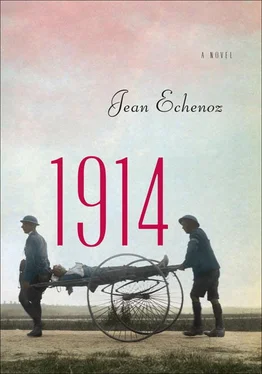Oh, by the way, Paris, wound up Monteil, when are you going there with Blanche? And the following week they arrived in the Gare Montparnasse, after Anthime had read every last newspaper on the train. Upon his return home from the front, he hadn’t wanted to keep up with the news, or at least hadn’t shown the slightest interest in the press—although he would sometimes leaf through a paper on the sly—but now, in their compartment, he borrowed the dailies from Blanche and plunged into the events of the day, focused entirely on the war. We were then in its fourth year, well after the particularly murderous business of the Chemin des Dames, the explosive events in Russia, and the first mutinies. [13] Chemin des Dames: The Chemin des Dames is nineteen miles long, running east and west along a ridge between two river valleys. “The Ladies’ Path” was the carriage road taken in the eighteenth century by the daughters of Louis XV when traveling between Paris and the Château de Boves, but in World War I it lay in a strategic sector held by the French army on the Western Front. Pushing the invaders back after the Battle of the Marne, the Allied armies were finally halted on the ridge in September 1914 in the First Battle of the Aisne River, and by the end of January 1915 the Germans controlled that plateau. The front line remained essentially static—but not without casualties—until the Second Battle of the Aisne (April 16–25, 1917), when in what had been presented as a final French offensive for victory, General Nivelle threw seven army corps against the Chemin des Dames ridge, where the Germans were well dug in and had the high-ground advantage. After twelve days of fighting, the attackers had gained little and suffered such high casualties that the French public, kept informed by the newspapers, was outraged. After the massive losses in the battles of Verdun and the Somme, the toll taken at the Chemin des Dames shattered the morale of the disillusioned French troops. By early 1917, almost a million French soldiers had been killed in the war; those still alive were sick of the suicidal attacks demanded by their high command. The French Army Mutinies of 1917—the startling extent of which was hidden from the public at the time—began after the debacle of the Second Battle of the Aisne: French troops at the Chemin des Dames had been deserting in increasing numbers, but deserters became mutineers as soldiers refused to obey orders for further futile assaults. Revolution was in the air: Nicholas II, the last tsar of Russia, had abdicated on March 2, 1917, and a month later, units of Allied Russian soldiers among the Chemin des Dames troops were singing “The Internationale.” In the end, almost half the French infantry at the Western Front may have taken part in insubordination at some point, encouraged at times by the stunning example of the Russian Revolution, news of which was spread by socialist newspapers and the infantry rumor mills.
Anthime read about all that with close attention.
Blanche had reserved two rooms at the other end of Paris in a hotel run by some family cousins, so they took a taxi at Montparnasse and, as it passed in front of the Gare de l’Est, they saw groups of men on leave milling about, either arriving from the battlefield or on their way back, possibly drunk but certainly vehement, looking angry, singing songs the couple could not clearly hear. Anthime asked the driver to stop the taxi for a moment, got out, and went over to the main entrance hall of the station, where he watched the bands of soldiers for a few minutes. Some of them were singing seditious songs off-key, and Anthime recognized “The Internationale”, which opens martially in an ascending fourth, as do quite a few songs and hymns of a patriotic, bellicose, or partisan nature. Anthime stood perfectly still and his face showed no expression as he raised his right fist in solidarity, but no one saw him do it.
At the hotel the cousins showed them to their rooms, which were across the corridor from each other. Leaving their luggage there, Blanche and Anthime freshened up, then went out for a walk before going to dinner. Later, after each had retired to bed, there was every indication that they would both sleep in their separate rooms except that in the middle of the night Anthime woke up. He rose, crossed the corridor, pushed open Blanche’s door, and went in the darkness toward the bed where she wasn’t sleeping either. He lay down beside her, took her in his arm, then entered and impregnated her. And the following autumn, during the very battle at Mons [14] Mons: Mons is the capital of the Belgian province of Hainaut, where the British Expeditionary Force fought its first battle of the Great War on August 23 and 24, 1914, against the advancing German First Army. Outnumbered by three to one, and left vulnerable when the sudden retreat of the French Fifth Army exposed their right flank, the British withdrew in good order for more than 250 miles, hard-pressed by the Germans, all the way to the outskirts of Paris. There, together with six French field armies, they were at last able to reverse the Allies’ fortunes at the last-ditch Battle of the Marne and begin driving the Germans back to what would become the infamous trenches of the Western Front. During the Hundred Days Offensive (August 8–November 11, 1918), beginning with the Battle of Amiens, a series of Allied attacks forced the Central Powers to retreat behind the “impregnable” Hindenburg Line—permanently breached in September—and ultimately to accept an armistice. As part of this offensive, the Canadian Corps of the British First Army fought a number of battles along the Western Front from Amiens to Mons, where a memorial plaque in the city hall bears the inscription: MONS WAS RECAPTURED BY THE CANADIAN CORPS ON THE 11TH NOVEMBER 1918: AFTER FIFTY MONTHS OF GERMAN OCCUPATION, FREEDOM WAS RESTORED TO THE CITY: HERE WAS FIRED THE LAST SHOT OF THE GREAT WAR.
that turned out to be the last one, a male infant was born who was given the name Charles.
Also by Jean Echenoz from The New Press
Lightning
Running
Ravel
Piano
I’m Gone
Big Blondes
PUBLISHING IN THE PUBLIC INTEREST
Thank you for reading this book published by The New Press. The New Press is a nonprofit, public interest publisher. New Press books and authors play a crucial role in sparking conversations about the key political and social issues of our day.
We hope you enjoyed this book and that you will stay in touch with The New Press. Here are a few ways to stay up to date with our books, events, and the issues we cover:
• Sign up at www.thenewpress.com/subscribeto receive updates on New Press authors and issues and to be notified about local events
• Like us on Facebook: www.facebook.com/newpressbooks
• Follow us on Twitter: www.twitter.com/thenewpress
Please consider buying New Press books for yourself; for friends and family; or to donate to schools, libraries, community centers, prison libraries, and other organizations involved with the issues our authors write about.
The New Press is a 501(c)(3) nonprofit organization. You can also support our work with a tax-deductible gift by visiting www.thenewpress.com/donate.

NEW YORK
LONDON
The New Press gratefully acknowledges the Florence Gould Foundation for supporting the publication of this book.
© 2012 by Les Éditions de Minuit
English translation © 2014 by The New Press
All rights reserved.
No part of this book may be reproduced, in any form, without written permission from the publisher.
Читать дальше










